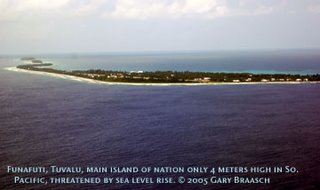Thursday, October 12, 2006

Environmental Issues
Warming Winds, Rising Tides: Tuvalu
The 11,000 Tuvaluans live on nine coral atolls totaling 10 square miles scattered over 500,000 square miles of ocean south of the equator and west of the International Dateline. Tuvalu is the smallest of all nations, except for the Vatican. Tuvalu has no industry, burns little petroleum, and creates less carbon pollution than a small town in America. This tiny place nevertheless is on the front line of climate change. The increasing intensity of tropical weather, the increase in ocean temperatures, and rising sea level -- all documented results of a warming atmosphere -- are making trouble for Tuvalu.
Tuvaluans face the possibility of being among the first climate refugees, although they never use that term. Former assistant Environmental minister and now assistant secretary for Foreign Affairs Paani Laupepa said he felt threatened. "Our whole culture will have to be transplanted."
Sea level rise is the greatest problem. Tuvalu's highest elevation is 4.6 meters -- 15 feet -- but most of it is no more than a meter above the sea. Several times each year the regular lunar cycle of tides, riding on the ever higher mean sea level, brings the Pacific sloshing over onto roads and into neighborhoods. In the center of the larger islands the sea floods out of old barrow pits and even squirts up out of the coral bedrock. Puddles bubble up that eventually cover part of the airport on the main island of Funafuti and inundate homes that are not along the ocean.
This February, the tides were driven against the shore by unusual westerly winds, and there was increasing erosion. The main asphalt road is only about 10 km long, yet it runs right along the lagoon in many places and was covered in water and coral rocks thrown up by the tide. Hundreds of wood frame and corrugated metal roofed homes and several churches, built right on the lagoon, were drenched by the wind waves riding on the higher tides.
The islands are not going to go under immediately. Yet the effects accumulate, year by year. "Even if we are not completely flooded, " said Laupepa, "in 50 to 70 years we face increasingly strong storms and cyclones, changing weather patterns, damage to our coral reefs from higher ocean temperatures, and flooding of all our gardens." Not growing enough food and decreasing fish catch if reefs are damaged would mean "importing more food, more foreign exchange, and more health and diet problems, " he said.
